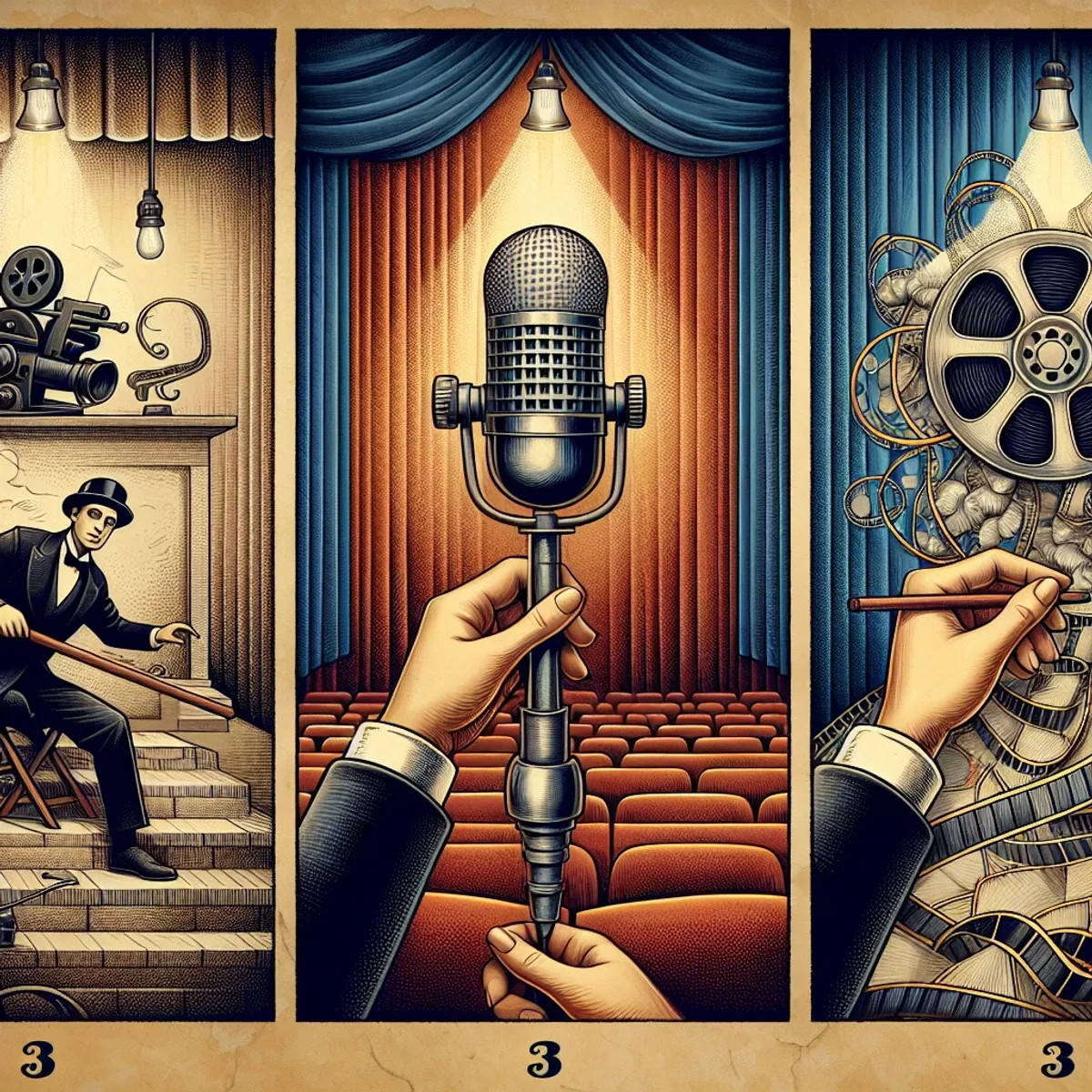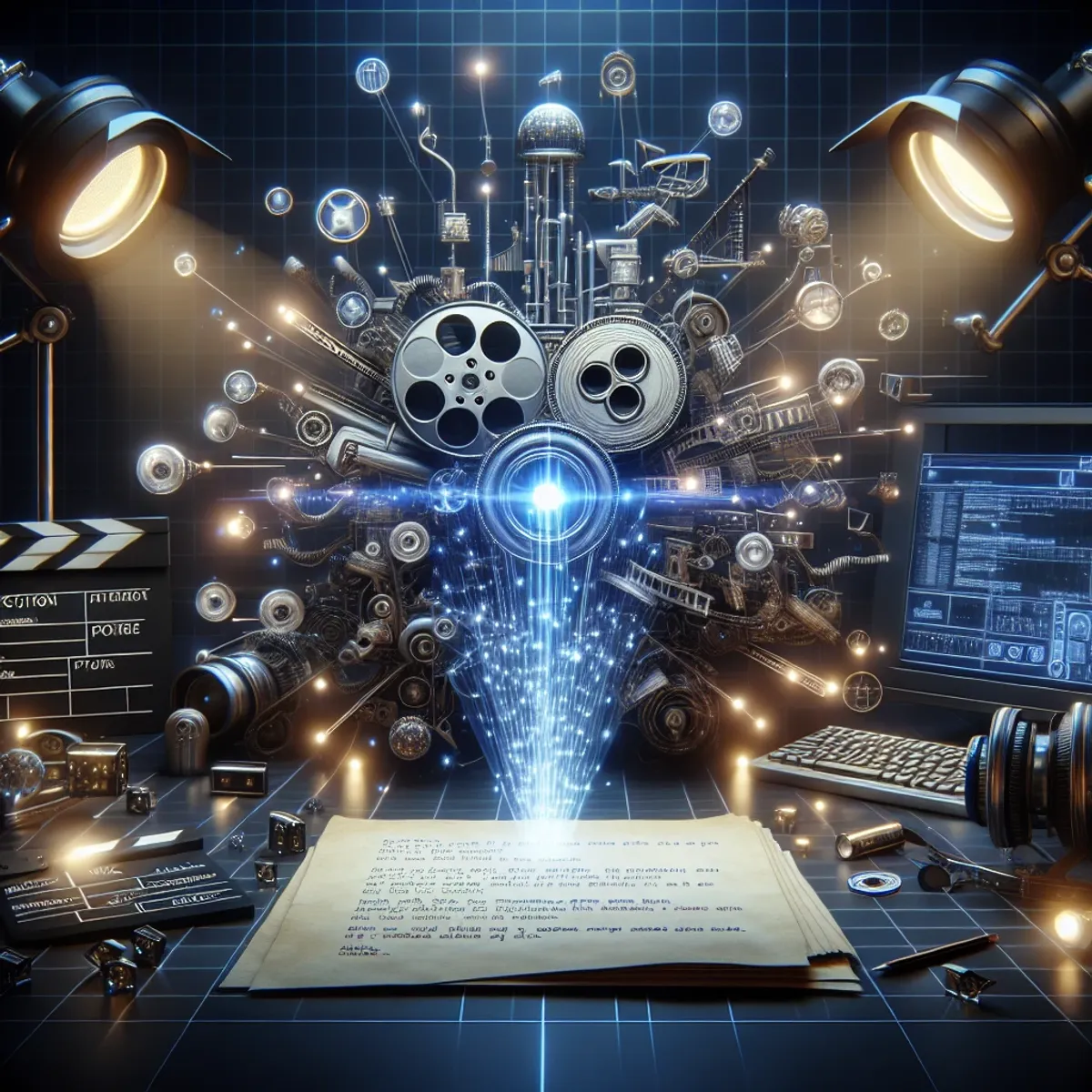
Introduction
Technology is moving super fast right now and it’s really changing a lot of industries, including film. One of the biggest shifts is how Artificial Intelligence (AI) is being used to help write scripts and screenplays. AI uses special language programs called Natural Language Processing (NLP) to create text or scripts based on whatever topic or theme you give it.
This kind of technology doesn’t really replace human creativity, it’s more like it supports it and kind of boosts it. So AI becomes a helpful tool for improving the scriptwriting process instead of taking it over. It can help writers get past creative blocks, and gives quick feedback to make scripts better and clearer. Also, AI content generator tools make it easier for writers and AI to work together, which can lead to more consistent and polished scripts.
Key Takeaway:
AI in scriptwriting is basically a strong helper for screenwriters. It speeds up the writing process, sparks creativity, and helps produce great scripts, while still keeping the human side of storytelling that really matters.
The Evolution of Screenwriting

Screenwriting has changed a lot over time. It started out as really simple silent stories in the first movies, where no one even talked and everything was just shown on screen. And now, after years and years of new ideas and styles, it has turned into the kind of complex plots and layered stories we enjoy watching today.
Silent Film Era: Focus on Visual Storytelling
During the silent film era, writing scripts was actually pretty simple. Since there was no sound, stories had to be told mostly through images and those short text screens that popped up sometimes. This era really focused on visual storytelling, so the way scenes were arranged and the kind of big exaggerated acting people did was super important and really carried the whole thing.
Talkies: Making Dialogue Important
When technology got better and sound was finally added to movies, screenwriting changed a lot, like a whole lot. Dialogue suddenly became this really important way to show the story and what characters are feeling inside, not just what they do. This kicked off the era of "talkies," which was a huge change in screenwriting history and, honestly, kind of the start of a new way people watched movies.
Modern Times: More Complex Stories and Deeper Characters
These days, stories are way more complicated. A lot of them mix a few different plots together, and sometimes the timelines jump around too, so it’s not always told in order. Characters feel more detailed now, with clear reasons for what they do and real backstories. Because of this, scripts have become really rich and full of little details everywhere.
As stories changed over time, what audiences want changed too. In the early days, people were honestly just amazed to see moving pictures at all. That was enough. But now, viewers expect more. They want engaging plots, characters they can relate to, and dialogue that actually sounds believable, like something real people might say.
Key Changes in Screenwriting:
- Silent films focused mainly on visual storytelling.
- Talkies added important spoken dialogue to scripts.
- Modern scripts feature complex stories and layered characters.
Screenwriting has kept changing again and again, shaped by new technology and what audiences happen to like at the time.
The Role of AI in Scriptwriting

Scriptwriting is a really creative process, and it needs a lot of imagination and your own style. Your own voice, basically. But it can also be pretty hard sometimes, like when you hit writer's block or just can’t think of a new idea for your story at all. Lately, Artificial Intelligence (AI) has started becoming this surprisingly helpful tool for writers, giving them new ways to get through those blocks and actually improve how scripts are written.
AI uses things like Machine Learning (ML) and Natural Language Processing (NLP) to kind of change how scriptwriting works. With these technologies, tools can look at huge amounts of data, understand the small details of language, and then create clear and pretty solid stories from that.
For example, AI-powered programs like Final Draft can do smart formatting that follows industry rules for you, which saves a lot of time, and they can even help build plots by suggesting story ideas based on what you type in. And then there’s Celtx, which lets several people work together on the same script at the same time, while also helping organize ideas and keep the story feeling consistent from start to finish.
Another useful program is WriterDuet. It supports live teamwork too, and it uses AI to help build detailed character profiles and even suggest dialogue that matches their personalities. So your characters feel more real, or at least more thought out.
Using AI in scriptwriting comes with a bunch of benefits. You get better plot ideas from data-driven suggestions, easier character creation with rich backgrounds, and smoother teamwork that helps keep everyone literally on the same page.
As these tools keep getting better, they’re going to keep changing how stories are created in movies and TV. Probably faster than we expect, honestly.
Benefits of Using AI Content Generator Tools in Scriptwriting
One significant advantage of AI Content Generator Tools in scriptwriting is their ability to help writers overcome creative blocks. You know, those moments when your mind just goes blank. With advanced tools like Junia AI, you can generate new ideas and fresh viewpoints for your scripts without spending hours staring at the screen. These tools leverage machine learning to propose original plotlines, character developments, or different dialogue options based on your inputs.
Generate Ideas and Beat Writer's Block
If you're struggling with an important scene or a major plot twist, instead of grappling for hours and feeling frustrated, you can simply use an AI tool to generate diverse scenarios or dialogues. It's like brainstorming with a super fast partner. This can provide new inspiration and sometimes even steer your script in a more intriguing direction.
Get Instant Feedback
In addition to enhancing creativity, AI Content Generator Tools also provide instant feedback on your scripts, which significantly improves the quality of your work. For instance, using Junia AI's story generator, you receive quick tips on aspects like plot flow, pacing, character growth, and more. This means you don't have to wait for someone else to read it before making changes. Instead, you can adjust your script right away as you write.
Work Better with AI as a Partner
Another major benefit of using AI in scriptwriting is learning to collaborate better with it as a kind of partner. When you perceive AI tools as partners rather than mere helpers, you can produce stronger and more engaging scripts. For example, if you're writing a sci-fi movie script that adheres to certain genre rules, an AI tool can analyze similar successful films and provide insights on popular themes, common patterns, and story structures. All that research stuff helps make your story stronger and ensures it resonates with your audience.
Useful for Many Types of Scripts
AI scriptwriting tools aren’t just limited to movies or TV shows either. They are also beneficial for playwrights, novelists, content creators, marketers, and really anyone who needs to tell a compelling story. With the right tool from Junia AI such as their video script outline generator or their innovative reel script generator which creates engaging Instagram reels scripts quickly for creators, marketers, and small businesses you can:
- Beat writer's block
- Get instant feedback
- Work better together with AI
These tools specifically boost your video content by providing faster, creative, and engaging video scripting through its efficient script outline generation capabilities while also helping create captivating Instagram reel scripts in no time.
Moreover, if you're venturing into the realm of TikTok content creation, Junia AI's free tiktok video script generator can skyrocket your TikTok content by unleashing limitless creativity and making TikTok success a reality.
Popular AI Tools for Scriptwriting
AI writing tools have really changed how people do scriptwriting. With advanced tech like GPT-4 and all that, these tools help you get past writer's block, give quick feedback, and even make it easier for writers and AI to work together. So yeah, let’s look at some popular AI tools that are out there in the market right now.
1. Junia AI
Junia AI doesn’t just help scriptwriters improve their search rankings and online presence, it also gives tips on how to boost SEO without backlinks. That kind of makes it a really valuable resource for writers who want to grow their digital footprint and be more visible online.
2. ChatGPT
ChatGPT is great for the early stages of scriptwriting. It can throw out fresh ideas and different dialogue options that kind of kickstart the creative process when you’re stuck or just getting started.
3. Jasper
Jasper is really good at crafting engaging stories and more complex plots. It’s a fantastic ally for scriptwriters who want to go deeper into their narratives and build something more detailed.
4. WriteSonic
WriteSonic is a pretty versatile tool. It can generate blog posts, marketing copy, and scripts while still keeping things original and creative. So it’s useful for more than just one kind of writing.
5. CopyAI
CopyAI is built to help with coming up with ideas, writing persuasive copy, and even creating full scripts pretty easily. It kind of takes a lot of the pressure off the blank page.
6. ShortlyAI
ShortlyAI focuses more on long-form content like screenplays. It gives helpful suggestions for plot development and character dialogue, which can really shape your script better over time.
Each of these tools has its own unique features that can really improve both the quality and the speed of scriptwriting. They sort of mark a new era where AI works alongside human creativity to help craft stories that actually connect with audiences.
It’s important to remember though, these tools are there to support you, not replace human creativity in scriptwriting. They act more like assistants that help unlock new levels of creativity and efficiency. With AI support, scriptwriters can spend more time on their core creative ideas while the AI helps with idea generation and content improvement stuff.
Also, using these advanced tools can be really helpful for creating long-form content which helps with SEO. And if you’re interested in checking out more blog writing templates or different formats, Junia AI has a big collection of blog templates that can be a really helpful resource.
Improving Script Quality with AI Help
You might be wondering how artificial intelligence can actually improve a screenplay. Like, what does it even do. One big way AI helps scriptwriters is by coming up with the first round of ideas and outlines. This saves a lot of time and kind of gets your creativity going while you write.
How AI Tools Help Scriptwriting
AI tools like GPT-4 use smart technology to give writers unique plot ideas based on a topic you type in. They can also create outlines that help you keep the story organized and clear.
Here are some ways AI tools assist scriptwriters:
- Idea Generation: AI suggests different viewpoints and unique themes to help you get past writer’s block. For example, you enter a few keywords, and the AI gives you several interesting plot ideas to pick from.
- Outline Creation: After you choose an idea, AI helps build a detailed outline that can include characters, scenes, and key plot points.
Other Ways AI Can Improve Scriptwriting
Besides ideas and outlines, AI can also help a lot with developing characters and dialogue:
- Character Development: AI can suggest traits and story arcs that add more depth to your characters, based on genre or successful examples it has seen before.
- Dialogue Improvement: AI offers creative dialogue options that match each character’s personality and situation, so the conversations feel more natural.
In short, human creativity is still the main thing, but using AI tools can really improve your scripts by helping with ideas, structure, character building, and dialogue. It kind of just makes the whole process smoother.
Limitations of AI in Scriptwriting
AI tools like ChatGPT, Plotdot, and Nolan have gotten way better at scriptwriting over the years, but yeah, they still have some limits:
They use advanced stuff like machine learning and natural language processing, which sounds super smart, but they can still struggle when it comes to really understanding deep human emotions or cultural details that actually matter a lot for making great stories.
Also, even though software for collaborative writing is really helpful for teamwork and creativity and all that, AI’s ability to come up with new ideas still depends a lot on the quality of the data it was trained on. If the data is kind of limited or not that great, the ideas usually are too.
1. Understanding Complex Stories
- AI like ChatGPT 5 still has a tough time really getting complicated stories and showing those small, subtle feelings the way people do.
- It usually can’t catch onto tiny language hints, like sarcasm or irony or even metaphors, that make a story feel deeper and more interesting.
2. Dependence on Data Quality
- AI suggestions are basically only as good as the data they get to work with.
- If the data is bad or kinda messy, it can lead to script ideas that are inaccurate or just really confusing.
3. Understanding Context
- AI is really good at spotting patterns in data, but it usually doesn’t fully get the meaning behind them, like the deeper stuff.
- Because of that, you end up missing creativity and that personal touch you normally feel from human-written scripts.
"AI helps with scriptwriting but can't replace human creativity and intuition."
Future Possibilities of AI in Scriptwriting
Even though it has some limits right now, AI still has a ton of potential for the future of scriptwriting. Like, there are so many things it could do as it keeps getting better:
1. Working Together: Humans and AI
- When you mix human creativity with a bit of AI help, it usually makes your scripts turn out way better.
- Tools like Junia's AI Text Editor let writers kinda team up with AI so they can boost their creativity and come up with more ideas.
2. Automation of Routine Tasks
- Using AI to handle tasks like coming up with first ideas and giving instant feedback can really help writers save a lot of time, so they can focus more on the main parts of their stories. It kind of takes care of the boring stuff in the background while you work on the important details.
3. Advancements in Technology
- In the future, technology will probably keep getting better, and that might help AI understand stories more clearly and make more interesting characters too.
- There are already tools being worked on, like virtual reading with actors' voices and AI-made virtual movies, and stuff like that is bringing us closer to a future where AI can really help improve scripts.
So yeah, even though there are still some challenges, the future of using AI in scriptwriting actually looks pretty promising. When we understand its limits and use AI to support human creativity instead of replacing it, we can make more engaging scripts that really connect with audiences.
AI Uses in Different Industries
AI is changing a lot of different industries right now, in all kinds of ways. It has a pretty wide range of uses. For example, in screenwriting and entertainment, AI tools are really helpful for supporting the creative work. They don’t totally replace people, but they can make the whole process easier and sometimes faster too.
AI's Impact on Screenwriting and Entertainment


![A robotic hand holding a quill pen with industry symbols like a stethoscope, shopping cart, and self-driving car in the background.]
AI is now helping screenwriters by tossing out plot ideas and different dialogue options. It looks through a huge amount of scripts, common themes, and real or fake conversations to mash together new story combinations. So yeah, it kind of speeds up brainstorming and helps writers get past writer's block when they’re just stuck staring at the page.
AI Tools for Ideas and Collaboration
- ChatGPT: Uses OpenAI’s GPT-3 to generate natural-sounding text from prompts you type in. It can whip up different kinds of dialogue and plot twists to bring in fresh ideas, sometimes more than you even wanted.
- Junia AI: Has an easy-to-use interface that suggests phrases or full paragraphs that match the story’s tone and style, so it feels like it actually fits instead of being random.
- Real-time feedback tools like Jasper and WriteSonic give quick tips while you’re writing to tweak and improve scripts as they’re being made, which makes the back and forth between writers and AI a lot smoother.
AI for Predicting Box Office Success
![A futuristic AI system analyzing a script with cinematic elements.]
ScriptBook uses AI to study parts of a script like characters, plot, and genre to guess how well a movie might perform at the box office. This kind of helps producers figure out which scripts they should approve and which ones maybe aren’t worth the risk.
These AI tools are changing how stories get created, how workflows are handled, and even how investment choices are made in film. It’s kind of creeping into every part of the process.
But still, it’s important to remember AI is just a tool. It can spark ideas and speed up creativity, but it can’t actually replace human imagination. As we start using AI more and more, we really have to protect the human side of storytelling the emotions, the realness, the unique viewpoints that actually connect with audiences.
AI in screenwriting is still growing and shifting. New tools keep popping up, each one saying it will change how stories are made. The real trick is using these tools to support our storytelling without losing what makes us human in the first place.
Addressing Concerns About AI in Screenwriting
A lot of people get worried that AI in scriptwriting might replace human creativity. It’s a pretty common fear actually. But if you think about it for a second, AI is really just a tool meant to help writers, not kick them out of the picture. Storytelling is still, and honestly always will be, a very human thing.
AI as a Helper, Not a Replacement
AI is already used in so many fields like healthcare, finance, automotive, and entertainment, and it’s there mostly to support people, not steal their jobs. For example:
- In healthcare, AI helps doctors diagnose diseases, kind of like giving them extra eyes on the data.
- In finance, AI analyzes data to guide investment decisions and spot patterns people might miss.
- In automotive, self-driving cars use AI to navigate and react to the road.
So in the same way, AI tools can assist screenwriters and make parts of the process easier, without actually replacing their creativity or their voice.
Successful Examples of AI in Screenwriting
AI is already being used in real screenwriting projects and actual productions, and it’s kind of wild. It’s not just a future idea anymore. People are really trying it out and using it in different ways, which shows what this technology can actually do.
1. "Sunspring" Short Film Experiment
One really cool example is the Sunspring short film project. This one stood out because it actually turned an AI written script into a real movie on screen. Benjamin, which is a kind of AI called a recurrent neural network, was trained on a bunch of science fiction scripts and then it wrote a brand new one. The story it made was pretty weird and sometimes kind of confusing, honestly, but it also showed a new way of telling stories and sort of pushed how far AI can go.
Here are some key lessons from this project:
- Accepting Surprises: The Sunspring project showed how AI can bring unexpected ideas into scriptwriting, which can actually help spark creativity.
- Working Together: It also showed how important it is for tech experts, writers, and filmmakers to work together, so they can understand and shape AI’s results in a way that makes sense for the audience.
- Creative Freedom: Most importantly, it proved that even with AI involved, there is still plenty of room for human creativity and interpretation.
2. ScriptBook's Box-Office Predictions
ScriptBook is a pretty good example of using AI to predict box-office results just by looking at script details. It studies the script and then, kind of amazingly, its predictions are more accurate than a lot of traditional methods. This really shows how AI can help people make better decisions in the film industry.
This shows us:
- Data-Driven Insights: ScriptBook proves that AI data analysis can give really useful advice to filmmakers, not just random guesses.
- Risk Management: It also shows how AI can help reduce financial risks by predicting box-office success before filming even starts.
All these examples make it pretty clear that AI can support scriptwriting by offering new insights and making the whole process more efficient. But still, human creativity and intuition are super important. AI tools are meant to assist people, not replace them or anything.
As the film industry keeps exploring AI, it’s kind of exciting to imagine what new tools might show up next. By using these technologies early on, writers and filmmakers can really take advantage of AI while still keeping that human touch that makes stories feel special.
Learning from projects like Sunspring and ScriptBook helps guide how we use AI in scriptwriting in the future. The main goal is to combine AI with human creativity so we can tell better stories and make more successful films.
Conclusion
Scriptwriting really depends a lot on human creativity, but Artificial Intelligence (AI) can still help make the whole process easier and honestly a bit smoother too. AI can help with pretty much everything, from coming up with ideas to actually formatting scripts and keeping things organized.
- AI in scriptwriting - When it’s used in a smart way, AI in scriptwriting can help writers get past writer’s block by suggesting fresh ideas they might not have thought of. It can also give quick feedback that helps improve the script’s quality, the pacing, and the overall flow of the story.
- The human touch - Even with AI’s help, it’s still really important to remember that it can’t fully understand stuff like sarcasm, complex humor, or really deep emotions. Those small details and subtle touches, the ones that make a story feel real, can only be added by a human writer.
- Future prospects - In the future, AI might become a lot better at analyzing stories, noticing patterns, and helping with developing characters. But its success will still depend on finding the right balance between using AI tools and keeping human creativity at the center.
In the end, AI should be seen more like a helper, not a replacement for writers. It can make the creative process better and faster without completely taking over. As writers and filmmakers use AI carefully and thoughtfully, it could lead to some really exciting changes in scriptwriting and the film industry overall.
